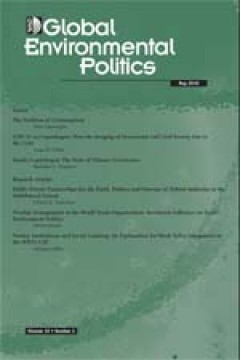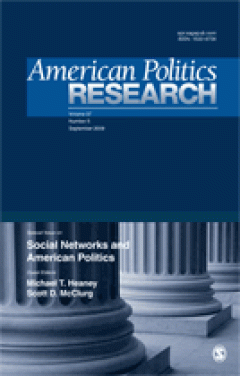Filter by

A Conceptual Model for Organizational Citizenship Behavior Directed Toward th…
This article extends the literature of organizational citizenship behavior in the context of environmental efforts. The authors provide support for the development of the construct, organizational citizenship behavior directed toward the environment (OCBE). They define OCBE as environmental efforts that are discretionary acts, within the organizational setting, not rewarded or required from the…
- Edition
- Vol. 48 no. 2, June 2009.pp. 243-256
- ISBN/ISSN
- 00076503
- Collation
- -
- Series Title
- Business Society
- Call Number
- -

How Politically Correct Is Political Correctness?: A SWOT Analysis of This Ph…
Political correctness (PC) seems to have exploded beyond all expectations in view of the weight that is currently attributed to this phenomenon in some societies on the globe. Indeed, PC can be considered an important factor in determining the success of an individual or group. At the same time, an �overdose� of PC, as with any other aspect of life, can lead to devastating effects. In this arti…
- Edition
- Vol. 48 no. 2, June 2009.pp. 257-266
- ISBN/ISSN
- 00076503
- Collation
- -
- Series Title
- Business Society
- Call Number
- -

To What Extent Is Business and Society Literature Idealistic?
The purpose of this article is to investigate to what extent is business and society literature idealistic as it advocates the adoption of high moral norms for business performance. The author discusses the central theses of mainstream themes in this literature�corporate social responsibility, corporate social responsiveness, social issues, corporate social performance, stakeholder management, …
- Edition
- Vol. 48 no. 1, March 2009.pp. 10-38
- ISBN/ISSN
- 00076503
- Collation
- -
- Series Title
- Business Society
- Call Number
- -

Collective Versus Individualist National Cultures: Comparing Taiwan and U.S. …
The business environment has increasingly expanded outside single nations or regions of the world to encompass many differing countries. Along with this expansion come business opportunities and challenges when facing business practices and attitudes not so similar to our own. In studying how these national cultural differences affect ethical decision making, managers and employees alike gain a…
- Edition
- Vol. 48 no. 1, March 2009.pp. 39-59
- ISBN/ISSN
- 00076503
- Collation
- -
- Series Title
- Business Society
- Call Number
- -

Private Management and Public Opinion: Corporate Social Responsiveness Revisited
This article presents a conceptual exploration of public opinion (PO) from the point of view of corporate social responsiveness (CSR2). The proposed PO-CSR2 framework encompasses four complementary means of framing public opinion: the philosophy of measurement of the market view (PO1); the action theory of the mobilization view (PO2); the negative, constraining mode of the social control view (…
- Edition
- Vol. 48 no. 1, March 2009.pp. 60-87
- ISBN/ISSN
- 00076503
- Collation
- -
- Series Title
- Business Society
- Call Number
- -

Corporate Social Responsibility Orientation, Goals, and Behavior: A Study of …
Corporate social responsibility orientation (CSRO) remains an important topic of researchers. However, one aspect of CSRO that has not been well researched is how it relates to behaviors and goals of managers. In this article, the authors explore that relationship, testing whether emphasis on a particular domain of social responsibility affects time spent dealing with specific stakeholder group…
- Edition
- Vol. 48 no. 1, March 2009.pp. 88-104
- ISBN/ISSN
- 00076503
- Collation
- -
- Series Title
- Business Society
- Call Number
- -

Vices and Virtues of Corporate Political Activity: The Challenge of Internati…
The authors give a critical reading of the research interests of state-of-the-art corporate political activity (CPA) literature. They demonstrate that a noncritical tendency in the literature to view CPA as a strategic activity, aimed at making profit, may encourage firms to sociopathic behavior in their political activities. Using psychiatric literature, the authors explore the nature of socio…
- Edition
- Vol. 48 no. 1, March 2009.pp. 105-132
- ISBN/ISSN
- 00076503
- Collation
- -
- Series Title
- Business Society
- Call Number
- -

Transparency in Global Environmental Governance: A Coming of Age?
This introductory article draws on the contributions to this special issue to consider the implications of a transparency turn in global environmental and sustainability governance. Three interrelated aspects are addressed: why transparency now? How is transparency being institutionalized? And what effects does it have? In analyzing the spread of transparency in governance, the article highligh…
- Edition
- Vol. 10, No. 3, August 2010. Pages 1-9
- ISBN/ISSN
- 15263800
- Collation
- -
- Series Title
- Global Environmental Politics
- Call Number
- -

Information Disclosure and Environmental Rights: The Aarhus Convention
Access to information is the first �pillar� of the Aarhus Convention on Access to Information, Public Participation in Decision-Making and Access to Justice in Environmental Matters (1998). This article examines how the information disclosure obligations on states within the Aarhus Convention express a particular blend of human environmental rights, conjoining procedural entitlements (and dutie…
- Edition
- Vol. 10, No. 3, August 2010. Pages 10-31
- ISBN/ISSN
- 15263800
- Collation
- -
- Series Title
- Global Environmental Politics
- Call Number
- -

Transparency as Contested Political Terrain: Who Knows What about the Global …
This article explores the prospects for transparency to be a transformative force in global biosafety governance. It analyzes whether information disclosure can further a right to know and choose, and hence facilitate oversight over transnational transfers of genetically modified organisms (GMOs). It examines the question of �Whose right to know what and why?� with regard to GMOs in the agricul…
- Edition
- Vol. 10, No. 3, August 2010. Pages 32-52
- ISBN/ISSN
- 15263800
- Collation
- -
- Series Title
- Global Environmental Politics
- Call Number
- -

Disclosure as Governance: The Extractive Industries Transparency Initiative a…
The global promotion of transparency for the extractive sector�oil, gas and mining�has become increasingly accepted as an appropriate solution to weaknesses in governance in resource-rich developing nations. Proponents argue that if extractive firms disclose publicly their payments to governments, citizens will be able to hold governments accountable. This will improve the management of natural…
- Edition
- Vol. 10, No. 3, August 2010. Pages 53-73
- ISBN/ISSN
- 15263800
- Collation
- -
- Series Title
- Global Environmental Politics
- Call Number
- -

Tamed Transparency: How Information Disclosure under the Global Reporting Ini…
In this contribution, we explore the tensions that seem inherent in the claim that transparency policies �empower� the users of disclosed information vis-�vis those who are asked to provide the information. Since these tensions are particularly relevant in relation to voluntary disclosure, our analysis focuses on the Global Reporting Initiative (GRI) as the world's leading voluntary corporate n…
- Edition
- Vol. 10, No. 3, August 2010. Pages 74-96
- ISBN/ISSN
- 15263800
- Collation
- -
- Series Title
- Global Environmental Politics
- Call Number
- -

Transparency in Nonstate Certification: Consequences for Accountability and L…
Nonstate certification programs have formed in the past 20 years to address social and environmental problems associated with production practices in several economic sectors. These programs embody the idea that information disclosure can be a tool for NGOs, investors, governments, and consumers to support high performers and hence, advocates hope, place upward pressure on sector-wide practices…
- Edition
- Vol. 10, No. 3, August 2010. Pages 97-119
- ISBN/ISSN
- 15263800
- Collation
- -
- Series Title
- Global Environmental Politics
- Call Number
- -

The National Context for Transparency-based Global Environmental Governance
Transparency-based global environmental governance, like all global governance, necessarily plays out in national contexts. Its efficacy is shaped not only by global politics but also by the norms and capacities prevailing within countries. Over the past two decades, there has been an extraordinary upheaval in transparency views and practices in numerous countries, rich and poor, democratic and…
- Edition
- Vol. 10, No. 3, August 2010. Pages 120-131
- ISBN/ISSN
- 15263800
- Collation
- -
- Series Title
- Global Environmental Politics
- Call Number
- -

The Future of Transparency: Power, Pitfalls and Promises
The growing attention to transparency is not an accidental and fashionable wave, soon to be replaced by another timely topic in environmental governance. Transparency is here to stay and to further develop in environmental politics, as it piggy-backs on a number of wider social developments. In assessing the achievements of transparency to date, this article concludes that it has on balance bee…
- Edition
- Vol. 10, No. 3, August 2010. Pages 132-143
- ISBN/ISSN
- 15263800
- Collation
- -
- Series Title
- Global Environmental Politics
- Call Number
- -

Assessing the Allocation of Pork: Evidence From Congressional Earmarks
Distributive politics represents one of the most important and controversial aspects of legislative policymaking. In the U.S. Congress, controversies over distributive politics are most evident in the area of legislative earmarking. In this article, we employ a unique set of data matching earmarks to their legislative sponsors to assess the leading explanations of distributive politics. We find…
- Edition
- Vol. 38 no. 6, November 2010.pp. 959-985
- ISBN/ISSN
- 1532673x
- Collation
- -
- Series Title
- American Politics Research
- Call Number
- -

Politics, Careerism, and the Voluntary Departures of U.S. District Court Judges
Prior studies hypothesize that judges time their retirements to allow a like-minded president to select their replacements. We propose a modification to this argument and theorize that during the earlier part of a district court judge�s career, it is the likelihood of elevation to an appeals court and other career-oriented concerns that affect whether the judge resigns or stays on the bench. It…
- Edition
- Vol. 38 no. 6, November 2010.pp. 986-1014
- ISBN/ISSN
- 1532673x
- Collation
- -
- Series Title
- American Politics Research
- Call Number
- -

The Lifecycle of Public Policy: An Event History Analysis of Repeals to Landm…
The first stage in the policy lifecycle�creation�has garnered significant attention while the final stage�repeal�has received scarcely any. To reconcile this imbalance, an extensive data set recording repeals to landmark laws enacted from 1951 to 2006 was complied. Event history analysis yields three significant results. First, the incidence of repeal exhibits a regular pattern characterized by…
- Edition
- Vol. 38 no. 6, November 2010.pp. 1015-1051
- ISBN/ISSN
- 1532673x
- Collation
- -
- Series Title
- American Politics Research
- Call Number
- -

Narrow Victories and Hard Games: Revisiting the Primary Divisiveness Hypothesis
The 2008 presidential election offers a unique opportunity to revisit the hypothesis that a divisive primary exacts a tolls on the party�s general election performance�neither party had a sitting president or vice president seeking the nomination, the Democratic nomination was contested all the way to the end, and advertising data provide a way to gauge both the intensity and tenor of the campa…
- Edition
- Vol. 38 no. 6, November 2010.pp. 1052-1071
- ISBN/ISSN
- 1532673x
- Collation
- -
- Series Title
- American Politics Research
- Call Number
- -

Vote Switching on Foreign Policy in the U.S. House of Representatives
How do party members manage recurring and divisive foreign policy agendas? Do they stay the course or switch their position? The annual decision in Congress regarding the extension of China�s most favored nation (MFN) status was a high-profile foreign policy battle between the anti-China coalition and its pro-China counterpart. To test theories of members� vote choice and change, this article a…
- Edition
- Vol. 38 no. 6, November 2010.pp. 1072-1101
- ISBN/ISSN
- 1532673x
- Collation
- -
- Series Title
- American Politics Research
- Call Number
- -
 Computer Science, Information & General Works
Computer Science, Information & General Works  Philosophy & Psychology
Philosophy & Psychology  Religion
Religion  Social Sciences
Social Sciences  Language
Language  Pure Science
Pure Science  Applied Sciences
Applied Sciences  Art & Recreation
Art & Recreation  Literature
Literature  History & Geography
History & Geography